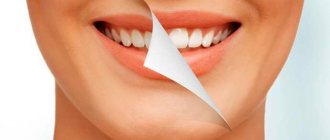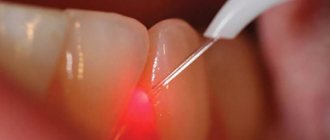“No pills!” is rule No. 1 for many expectant mothers. Indeed, taking 90% of medications during pregnancy is prohibited, since they can negatively affect the fetus.
But doctors do not recommend that pregnant women tolerate toothache: at a minimum, it leads to tone (tension) of the uterus, and in such conditions the baby in the tummy suffers from a lack of oxygen. So how can you relieve the aching pain so as not to harm yourself and your child? First things first.
How does a painkiller pill work?
When inflammation develops in the infected pulp or periodontal tissues, they produce enzymes that signal problems - prostaglandins. Prostaglandins go to pain receptors - nerve endings, and “turn on” pain.
Analgesics block the release of signaling enzymes, so pain disappears some time after taking them. The cause of toothache is an infection or inflammatory process that is not eliminated, and unpleasant symptoms reappear after a while.
Why are painkillers dangerous during pregnancy?
Most analgesics have a small molecular weight. When it enters the gastrointestinal tract, and then into the blood, the anesthetic breaks down into thousands of tiny particles - this is a necessary condition for manipulation at the level of nerve receptors and pain elimination.
The analgesic easily penetrates the placental barrier into the baby’s blood and organs, which leads to negative consequences in the form of:
- Improper intrauterine development of the fetus due to the toxic effects of drugs (teratogenic effect).
- Changes in blood pressure and blood pressure in a pregnant woman.
- Disorders of the kidneys and liver in the baby and mother.
- Water retention in the body and the appearance of swelling, gestosis.
- Irritation of the gastrointestinal tract, exacerbation of gastritis and peptic ulcers.
| Name of medicine | FDA Hazard Level | Use during pregnancy | Use during breastfeeding |
| Artikain | WITH | Possible after consultation | Unknown |
| Lidocaine | B | Can | Can |
| Mepivacaine | WITH | Possible after consultation | Can |
| Acetaminophen | B | Can | Can |
| Ibuprofen (Adex, Advil) | B - in the first and second trimester, D - in the third trimester | It is better not to use in the third trimester | Avoid use |
| Aspirin | C - in the first and second trimester, D - in the third trimester | It is better not to use in the third trimester | Avoid use |
| Clindamycin | B | Can | Can |
| Erythromycin | B | Can | Can |
| Metronidazole | B | Can | Can |
| Penicillin | B | Can | Can |
| Tetracycline | D | Avoid use | Avoid use |
Causes of toothache during pregnancy
Common sources of discomfort and pain in the oral cavity are some dental diseases:
- The developing carious process is sometimes accompanied by unpleasant sensations when eating hot or cold foods, as well as sweet or sour foods.
- Pulpitis is accompanied by acute toothache during pregnancy, especially worse at night.
- When inflammation occurs at the root of a tooth, pain is felt when pressing on it, which occurs as a result of the development of apical periodontitis.
- Difficulty in the eruption of wisdom teeth can also force the expectant mother to look for ways to help relieve toothache during pregnancy.
The female body during pregnancy is vulnerable and sensitive to changes in the internal balance of the body. The natural hormonal level changes, which causes disturbances in blood circulation, which negatively affects the condition of the gums and oral mucosa. In this case, gingivitis may occur and chronic processes may worsen.
As the child grows in utero, his needs for minerals and nutrients increase. The mother's body is especially sensitive to increased calcium excretion to build the bone skeleton of the unborn baby. This manifests itself in joint pain, and also negatively affects the teeth and jaw bones.
In addition, the changed composition and viscosity of saliva impairs the washing of teeth and their natural cleansing, and its protective properties are greatly reduced. All this leads to the formation of cavities in the teeth, and the resulting caries affects the reduced immunity of the expectant mother.
Remedies for toothache for pregnant women: what you can do
To choose a safe and effective pain medicine for a pregnant woman, consider:
- gestational age;
- weight of the expectant mother;
- the presence of hypotension, low blood pressure or, conversely, arterial hypertension - high blood pressure;
- concomitant diseases - diabetes, heart and kidney diseases; features of pregnancy.
As you understand, the best decision for the expectant mother would be to see a dentist. If this is not possible, call the gynecologist monitoring the pregnancy and consult about pain medication. Self-medication during pregnancy is strictly prohibited.
How to relieve aching toothache using folk remedies
Unpleasant sensations will not go away on their own if no action is taken. And there are times when pain occurs at night, when it is difficult to get to the clinic.
In this case, folk recipes help:
- A familiar and effective way to combat toothache is rinsing with soda or saline solutions. They must be strong in order to maximally clean the oral cavity from harmful bacteria and relieve pain. Pour a teaspoon of the desired substance into a glass of warm boiled water and mix thoroughly so that the particles do not settle on the teeth and tongue. The procedure is carried out after eating.
- Medicinal plants alleviate the condition. Chamomile rinses are effective, reducing sensitivity and temporarily relieving mild pain.
- A decoction of plantain and sage is used for mouth baths. The procedure is carried out three times a day for half an hour. It is advisable to retain the liquid at the location of the aching tooth for a while, then spit it out, and then take a new portion of the decoction.
- Aloe pulp applied to the sore spot relieves symptoms.
- You can apply a small piece of propolis to the aching tooth. In three out of five cases, this leads to the long-awaited result - relief from pain.
- Relieves discomfort by rinsing with water and three drops of tea tree oil.
For severe pain in the jaw and inflammatory processes, the help of a qualified specialist at any stage of pregnancy is mandatory.
In the early stages
In the first trimester of pregnancy (1-13 weeks), all organs and systems of the baby are formed. Medications during this period can disrupt the normal development of the fetus, so it is better to avoid them. But, if acute pain strikes you late or on a holiday, the doctor will prescribe:
Ibuprofen (Ibuprom, Nurofen), tablets
In addition to the analgesic effect, it also has an anti-inflammatory effect. Ibuprofen will help eliminate the symptoms of chronic pulpitis and inflammation of the ligaments of the tooth, periodontitis. 1 tablet contains 200 mg of active ingredient, and can be taken no more than 3 times a day.
For expectant mothers suffering from frequent attacks of heartburn, toxicosis or stomach pain, ibuprofen preparations are not suitable - they are made on the basis of propionic acid and irritate the gastrointestinal tract.
Dental drops
Contains essential oils of camphor, peppermint and valerian infusion. They have analgesic, anti-inflammatory and bactericidal effects. A cotton swab moistened with 2-3 drops is placed for 5-10 minutes in the tooth cavity destroyed by caries. This relieves pain from deep caries and pulpitis.
The use of dental drops requires precautions: if ingested, they can provoke an attack of vomiting, and if in contact with mucous membranes, cause a burn.
Gel Kamident
A combination of substances with analgesic (lidocaine), anti-inflammatory (chamomile) and antibacterial (thymol) properties. A drop of gel is applied to the root zone of the diseased tooth and rubbed in. The gel reduces sensitivity in inflamed gums, which helps reduce pain during gingivitis, stomatitis and periodontitis.
Painkillers for pregnant women
The most popular painkillers and their effects on the fetus:
| Drug names | Features of application and permissible period |
| Paracetamol | It is the drug of choice for relieving toothache in pregnant women. In the first and third trimester - admission under the strict supervision of a doctor. |
| Ketonal | Relieves mild pain symptoms. Recommended for diseases of the articular system. Not recommended during pregnancy. In the third trimester, it causes a delay in natural childbirth, increases the risk of bleeding, and is toxic to the child’s cardiovascular system. |
| No-shpa | Dilates blood vessels, relieves spasms. Helps relieve headaches. For toothache, it has a short-term analgesic effect only when applied topically (put the tablet into the cavity of a carious tooth). Oral administration for toothache is not advisable. In the first trimester, admission is possible only if there is a threat of miscarriage, with strict adherence to all the instructions of the attending physician. With caution - in the second and third trimester. |
| Diclofenac | It is safest in the form of gels and suppositories. Recommended for the treatment of diseases of joints and cartilage tissue. Pills or injections can cause problems with embryo formation in the first trimester. Prohibited in any form in the third trimester, due to possible complications:
|
| Ibuprofen | Anti-inflammatory drug. Has analgesic and antipyretic effects. Contraindicated in the third trimester. In the first trimester, use is possible only in cases of high temperature. In the second trimester, take with caution, without overdosing. |
| Aspirin | Anti-inflammatory drug with a mild analgesic effect. Not recommended throughout pregnancy. Causes blood clotting disorders and increases the risk of bleeding during childbirth. |
| Analgin | Analgesic with a pronounced effect. It is extremely dangerous to take in the first trimester and 6 weeks before giving birth. Causes disturbances in the formation of the fetal cardiovascular system. Banned in some countries. |
| Efferalgan | Contains paracetamol. Antipyretic with analgesic effect. In the first and third trimester, the appointment is under the supervision of a doctor. |
| Ketorol | Analgesic with mild antipyretic effect. Prohibited during pregnancy. In the first trimester it has a negative effect on the developing organs of the embryo. In the second, it causes disturbances in the blood circulation of the fetus. In the third, it increases the risk of bleeding during childbirth. |
| Nise | Anti-inflammatory agent with analgesic and antipyretic effect. Contraindicated during pregnancy. Causes severe malformations in the fetus. |
What drugs are allowed in the later stages for toothache?
The World Health Organization (WHO) recommends paracetamol as the only safe remedy for pain and fever.
It can also be taken in the 3rd trimester, however, after consultation with a doctor and under his strict supervision. Many remedies for fever and pain consist of paracetamol, for example, Efferalgan, Calpol, Cefekon D, Panadol.
Efferalgan
Kalpol Tsefekon D
Panadol
What to do for toothache in the early and late stages:
What to take for severe pain
To relieve pain, you can crush a No-Spa tablet and place it on the sore tooth.
Pain relief is achieved quickly, however, it does not last long - about 30 minutes. Lidocaine spray will instantly relieve pain. During pregnancy, it is used in a minimal dosage - no more than one spray of the medicine into the area of the affected tooth. For the same purpose, you can soak a cotton swab with lidocaine from ampoules and apply it to the gum. Spit saliva, do not swallow under any circumstances!
Attention! If you have severe toothache, you should contact a dental clinic as soon as possible. When visiting a doctor, be sure to inform the doctor about your pregnancy, its duration, and allergic reactions to medications.
Dental anesthesia during pregnancy:
Gels for topical use
Dental gels quickly relieve pain due to their cooling effect on the mucous membrane. Some of them fight germs in the mouth. The use of gels to relieve toothache is possible for a short period.
- Cholisal - quickly relieves pain, has an antimicrobial effect. Used for stomatitis, gingivitis, periodontitis. Squeeze out the gel with a strip 1 cm long and rub it into the gum near the painful tooth.
- Kalgel is an analgesic and antimicrobial agent. Relieves pain. It is used in infants during teething, and is used with caution by pregnant women. About 5-7 mm of gel is rubbed into the gums no more than 6 times a day.
- Dentinox - the effect on the body of a pregnant woman has not been studied, so it is used with caution. A pea-sized drop of gel is rubbed into the gums 2-3 times a day.
Holisal
Kalgel
Dentinox
When treating toothache, follow these rules :
- Before using gel forms, clean your mouth - rinse or brush your teeth.
- Do not exceed the dosage - this is dangerous for the health of the woman and the unborn baby.
- Rub the gel into the gums only with a sterile spatula or a clean finger.
On the later lines
When taking analgesics in late pregnancy, there is a risk of disruption of the excretory and cardiovascular systems of the mother and child. During this period, medications are prescribed according to the principle of “minimum nephro- and hepatotoxicity,” that is, a negative effect on the functioning of the kidneys and liver.
From 15 to 38 weeks of pregnancy for toothache, doctors recommend:
- Paracetamol (Efferalgan, Panadol), tablets and suppositories are the safest painkillers known to modern medicine.
Paracetamol acts on pain centers in the nervous system, but does not affect the inflammatory process and the very cause of toothache. The tablet is taken after meals with plenty of water. For liver and kidney diseases, it is better to avoid paracetamol-based painkillers.
- Aspirin, tablets - the drug acts directly on the source of inflammation, temporarily blocks its development and relieves pain.
An aspirin tablet will help with severe toothache caused by acute pulpitis or periodontitis. But it is not recommended to take it if you have a stomach ulcer or blood disease.
Before taking the medicine, be sure to brush your teeth and remove food debris from the carious cavity - they can irritate the inflamed “nerve” and provoke further attacks of pain.
You cannot take different medications - for example, paracetamol first, and then ibuprofen a few hours later. According to research conducted by Canadian scientists, this increases the risk of intrauterine development disorders by 16 times.
Features of choosing methods for tooth anesthesia during pregnancy
When visiting a dental clinic, you must inform the medical staff about your pregnancy period. To relieve toothache in a pregnant woman, the most gentle medications are selected that do not penetrate the placenta and do not have a toxic effect on the fetus.
Precautionary measures
- The safest time for dental treatment and pain relief with suitable medications is the second trimester. At this time, all the baby’s organs are formed.
- In the first trimester, as well as in the last month of pregnancy, painkillers and anesthesia are indicated only in emergency cases.
- For pain relief in a dental clinic, preference is given to drugs containing a small amount of adrenaline - Ultracaine and Primacaine. "Ultracaine" does not penetrate the placenta and is also allowed during breastfeeding. "Primakaine" enters the body of the unborn child in minimal quantities, without having a toxic effect.
- Enduring a severe toothache is sometimes more harmful than taking medications approved during pregnancy. When pain occurs, the expectant mother's body produces adrenaline, which contributes to uterine hypertonicity. This condition can result in miscarriage or premature birth.
Features of dental treatment during pregnancy:
What is the danger
Toothache is a signal that there is a source of infection in a woman’s body, which can affect the intrauterine development of the child.
Inflammation of gum and pulp tissue is dangerous in the first trimester of pregnancy, when the formation of internal organs occurs. That is why it is important to undergo a preventive examination by a dentist, and, if necessary, to treat all teeth before pregnancy.
Some painkillers are toxic and cause developmental abnormalities . It is especially dangerous to take such medications in the first trimester of pregnancy (up to 12 weeks). At this time, all the organs and systems of the child are formed.
It is better not to carry out routine dental treatment accompanied by pain relief during this period. Exceptions are in emergency cases. In the last month of pregnancy, taking a number of painkillers, as well as anesthesia during dental procedures, can provoke uterine hypertonicity and premature birth.
Important! Self-medication for toothache for women “in an interesting position” can lead to miscarriage or premature birth, as well as to developmental defects and fetal death. Taking medications is possible only after consulting a specialist. The doctor will select medications that are not dangerous for the unborn baby.
Video on the topic:
Pain relief in a dental clinic
What will help you get rid of toothache 100%? Visit to the dentist.
Modern clinics are equipped with everything necessary for the safe diagnosis and treatment of pregnant women - radiovisiographs, intraoral cameras and systems for painless administration of anesthesia. Therefore, there is no need to be afraid that the procedures will harm you, your baby or cause even more pain.
The dentist will determine the cause of the problem and do:
- treatment of caries or its complications – pulpitis and periodontitis;
- extirpation (removal) of the neurovascular bundle, pulp;
- removal of a diseased tooth.
For acute pain, procedures are performed under local anesthesia, so you will feel relief immediately after the administration of the anesthetic.
Pulp extirpation
Anesthesia during pregnancy
For pain relief during pregnancy, anesthetics with rapid action and minimal harm are used:
- articaine: ultracaine, alfacaine;
- mepivacaine: scandonest, isocaine.
Both drugs do not cause allergic reactions, begin to act 1-4 minutes after administration and are not toxic to the baby in the womb - if necessary, they are administered even to newborn children (mepivacaine).
An injection of an anesthetic and removal of infected tooth tissue is much safer for the expectant mother and fetus, compared to taking a single dose of analgesic medication. But most importantly, they allow you to get rid of pain and further spread of infection.
So don’t waste your time and health on debilitating toothache - use the MyDentist search engine to make an appointment at the nearest 24-hour dentist!
Read more about caries during pregnancy in our article.
Prevention
To reduce the likelihood of toothache during pregnancy, you should follow simple recommendations:
- visit the dentist regularly;
- Treat carious cavities in teeth in a timely manner;
- make your diet balanced, make sure that your body receives enough nutrients;
- do not overuse sweets;
- take vitamin and mineral complexes to avoid treating toothache during pregnancy;
- brush your teeth twice daily, and also rinse your mouth with water after each meal;
- use additional hygiene products such as flosses and elixirs.
The expectant mother is responsible for the safe intrauterine development of the baby, so a pregnant woman should worry not only about her own well-being, but also constantly think about how her actions do not harm the baby. It is impossible to completely eliminate problems with the oral cavity, however, thanks to modern preventive measures, a healthy diet and visits to the doctor, you can reduce the risk of developing toothache during pregnancy.
Author: Violeta Kudryavtseva, doctor, especially for Mama66.ru










